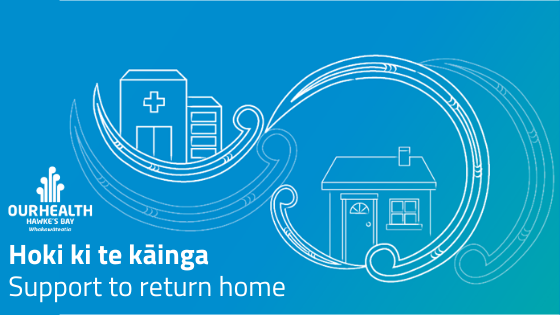Hoki ki te Kāinga - home support service
What is it?
Hoki ki te Kāinga is a service for people who will benefit from a short period of intensive rehabilitation in their own home after a stay in hospital.
It can be an alternative to inpatient rehabilitation for those who meet the criteria, enabling people who prefer to be at home to leave hospital earlier than they otherwise would. Therapists visit patients up to four times a day to help them to manage things like exercise programmes, dressing, showering and cooking meals.
The service is offered in the urban areas of Napier and Hastings, to clients who are medically stable (as assessed by their medical team while in hospital), and can manage toileting by themselves 24 hours a day or who have whānau at home to help.
It is targeted at older people (Pakeha over 65; Māori/Pasifika over 55), as they are the most likely to benefit, however it can be offered to younger clients if appropriate.
Hoki ki te Kāinga helps individuals regain their well-being and physical abilities, thereby increasing confidence and independence. It is about supporting the transition home from hospital and helping older people to continue living in their own homes for as long as they wish to.
The Waikato District Health Board START programme, on which Hoki ki te Kāinga is modelled, has achieved those aims, and reduced the amount of time spent in hospital and readmission rates.
The Hoki ki te Kāinga team includes registered nurses, occupational therapists, physiotherapists and rehabilitation assistants.
How does it work?
Clients are visited by a therapist or a nurse within 24 hours of returning home from hospital, to prepare a rehabilitation plan together. Those plans generally run for four weeks, however they can extend to six weeks if necessary.
Therapists and/or rehabilitation assistants visit Hoki ki te Kāinga patients up to four times a day to help them get the best out of their rehabilitation plan.
At the end of the plan, patients are referred to external services if needed, for example NASC (disability support) or EngAGE (older persons’ support).
People in hospital who think they may be eligible for rehabilitation at home should discuss the option with the doctors or nurses on their ward.
